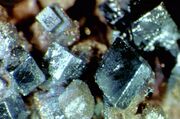Difference between revisions of "Acanthite"
Jump to navigation
Jump to search

m (Text replace - "== Authority ==" to "== Sources Checked for Data in Record ==") |
|||
| (3 intermediate revisions by the same user not shown) | |||
| Line 1: | Line 1: | ||
| + | [[File:Acanthite Webmineral.jpg|thumb|Acanthite (Argentite); Image credit [http://www.johnbetts-fineminerals.com/ John Betts]]] | ||
== Description == | == Description == | ||
| Line 7: | Line 8: | ||
acanthus | acanthus | ||
| − | + | == Physical and Chemical Properties == | |
| − | == | + | * Luster = metallic |
| + | * Streak = black | ||
| + | * Cuts like lead; indistinct cleavage | ||
| + | * Composition = Ag2S | ||
| + | * CAS = 21548-73-2 | ||
| + | * Mohs Hardness = 2.0 - 2.5 | ||
| + | * Melting Point = 845 C | ||
| + | * Density = 7.2 - 7.4 g/ml | ||
| + | * Molecular Weight = 247.8 | ||
| − | + | == Risks == | |
| − | |||
| − | |||
| − | |||
| − | |||
| − | |||
| − | |||
| − | |||
| − | |||
| − | |||
| − | |||
| − | |||
| − | |||
| − | |||
| − | |||
| − | |||
| − | |||
| − | |||
| − | |||
| − | |||
| − | |||
| − | |||
| − | |||
| − | |||
Sensitive to light. | Sensitive to light. | ||
| − | + | ==Resources and Citations== | |
| − | |||
| − | == | ||
| − | |||
| − | |||
| − | + | * WebMineral: [http://webmineral.com/data/Acanthite.shtml#.Yl3fPujMK7M Acanthite] | |
| − | * ''Encyclopedia Britannica'', http://www.britannica.com Comment: argentite" | + | * ''Encyclopedia Britannica'', http://www.britannica.com Comment: argentite" Accessed December 11, 2001, (gives conversion temperature as 91 C) |
| − | * C.W.Chesterman, K.E.Lowe, ''Audubon Society Field Guide to North American Rocks and Minerals'', Alfred A. Knopf, New York, 1979 Comment: Gives conversion temperature as 173 C | + | * C.W.Chesterman, K.E.Lowe, ''Audubon Society Field Guide to North American Rocks and Minerals'', Alfred A. Knopf, New York, 1979 Comment: Gives conversion temperature (acanthite to argentite) as 173 C |
[[Category:Materials database]] | [[Category:Materials database]] | ||
Latest revision as of 11:08, 8 December 2022

Acanthite (Argentite); Image credit John Betts
Description
A gray to black metallic mineral of Silver sulfide. Acanthite occurs in hydrothermal deposits and as a corrosion product of Silver. Large crystals of acanthite have been mined in Norway (Kongsberg), Mexico (Pachuca, Guanajuato, Zacatecas) and the U.S. (Nevada, Colorado, Montana). On silver, acanthite crystals can appear as black, shiny, acanthus-like leaflets. At temperatures above 173 C, acanthite is converted to Argentite.
Synonyms and Related Terms
acanthus
Physical and Chemical Properties
- Luster = metallic
- Streak = black
- Cuts like lead; indistinct cleavage
- Composition = Ag2S
- CAS = 21548-73-2
- Mohs Hardness = 2.0 - 2.5
- Melting Point = 845 C
- Density = 7.2 - 7.4 g/ml
- Molecular Weight = 247.8
Risks
Sensitive to light.
Resources and Citations
- WebMineral: Acanthite
- Encyclopedia Britannica, http://www.britannica.com Comment: argentite" Accessed December 11, 2001, (gives conversion temperature as 91 C)
- C.W.Chesterman, K.E.Lowe, Audubon Society Field Guide to North American Rocks and Minerals, Alfred A. Knopf, New York, 1979 Comment: Gives conversion temperature (acanthite to argentite) as 173 C